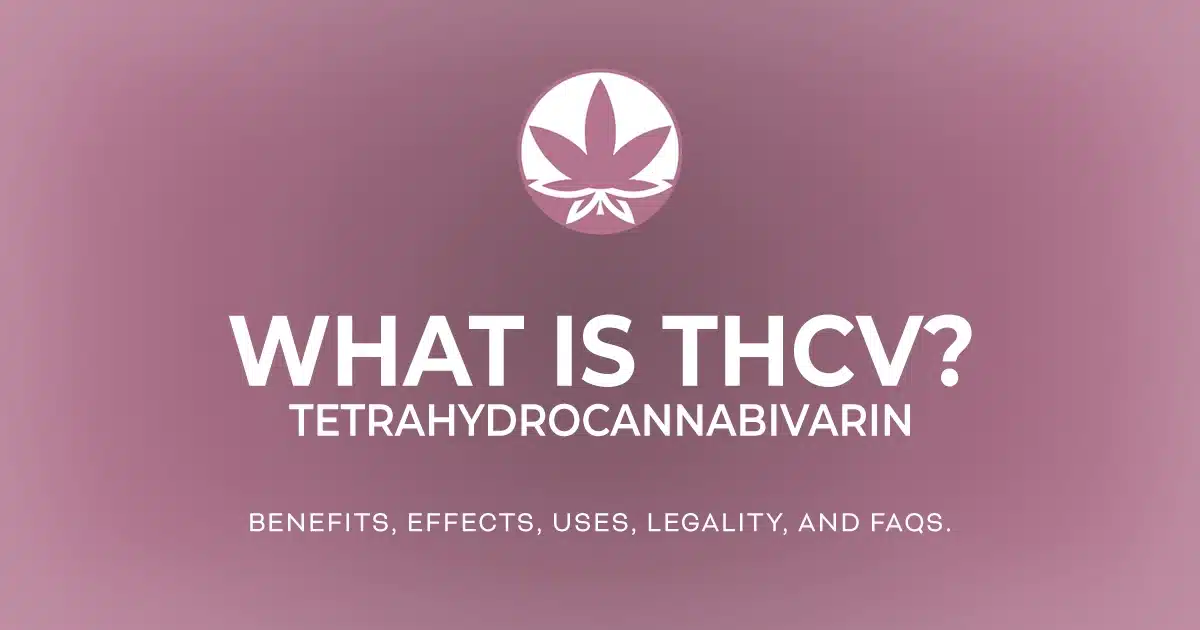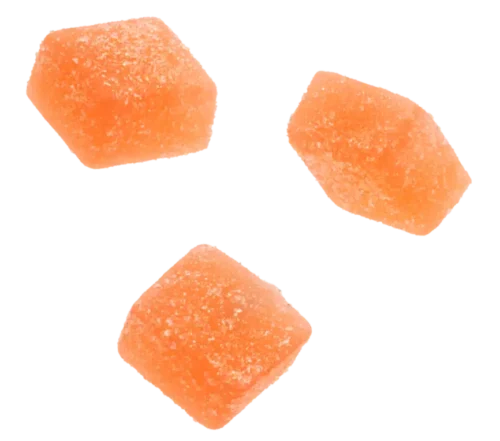What is THCV?


Christopher Visser
Multi-Cannabis Business Owner
Christopher Visser, the Founder and CEO of Cannabidiol Life and THCGummies.com, is a distinguished figure in the CBD industry, recognized for his pioneering contributions since 2016. With over 120 published articles, Christopher has become a reputable cannabis researcher, writer, and author. He's built two prosperous cannabis ventures that collectively generated millions in annual sales. His in-depth analysis of numerous cannabis studies, collaboration with medical professionals, and personal engagement with thousands of customers underline his expertise and commitment to advancing cannabis understanding daily.
-
 Written By:
Christopher Visser
Written By:
Christopher Visser
- Published:
- Updated: February 8, 2024
- Too Quiet, Light Up The Convo!
Ready to explore the lesser-known but equally fascinating world of THCV? Our comprehensive guide "What is THCV?" will walk you through everything you need to know about this unique cannabinoid, from its origins to its potential health benefits. No matter your level of familiarity with the world of cannabinoids, prepare to gain a richer, deeper understanding with us.
Table of Contents
- Tags: What Is
As the world of cannabis research continues to expand, the spotlight is now shining on a lesser-known compound called tetrahydrocannabivarin (THCv). This intriguing cannabinoid is capturing the attention of scientists and consumers alike due to its uniquely diverse properties and potential therapeutic applications. But what is THCV? Dive into the world of THCv and discover how it differs from its famous cousin, THC, and how it may hold the key to unlocking a new realm of clinically useful therapies.
Short Summary
This article provides an overview of THCv, including its origin, structure and effects on the endocannabinoid system.
Studies have demonstrated potential health benefits associated with THCv such as appetite suppression, cognitive function and diabetes management.
Navigating legal issues is essential to source high-THCV products safely for maximum effectiveness in improving health and well-being.
Understanding THCv: The Basics
THCv is a naturally occurring cannabinoid found in cannabis plants, and while it shares some structural similarities with THC, it possesses its own unique set of psychoactive effects and potential therapeutic benefits. From appetite suppression and weight loss to cognitive function and Alzheimer’s disease, THCv is steadily gaining recognition for its potential to improve various aspects of human health.
So let’s delve deeper into the fascinating world of THCv and learn more about its origin, structure, and impact on the endocannabinoid system.
What is Tetrahydrocannabivarin?
Tetrahydrocannabivarin (THCv) is a major component isolated from Cannabis sativa, identified through research. THCv has been suggested as a potential therapeutic benefit due to its lack of psychoactive effects in comparison to THC. In other words, THCv may provide some of the same benefits as THC without the intoxicating “high” typically associated with cannabis use.
Research has shown that THCv may offer a range of potential therapeutic benefits, from appetite suppression and weight management to neuroprotection and relief from inflammatory pain. As we continue to learn more about this fascinating compound, it’s clear that THCv’s unique properties hold promise for a range of clinically useful therapies.
Origin and Structure of THCv
THCv is a psychoactive cannabinoid found in the hemp plant Cannabis, and it is a homologue of tetrahydrocannabinol (THC) with a propyl structure. The concentrations of THCv naturally vary within the cannabis plants.
The primary structural variation between THCv and THC is the length of their hydrocarbon chains, with THCv having a slightly shorter chain.
Potential Health Benefits of THCv
THCv has been suggested to offer a variety of potential health benefits, including appetite suppression, cognitive function, bone growth, inflammation, and diabetes management. While research in this area is still emerging, studies have shown promising results in various aspects of human health.
Let’s take a closer look at the specific health benefits associated with THCv.
Appetite Suppression and Weight Management
One of the most intriguing aspects of THCv is its potential to suppress appetite and aid in weight management. Research on rodents has demonstrated that THCv can decrease appetite, increase satiety, and insulin sensitivity and enhance energy metabolism. This is a significant finding, as it suggests that THCv could be a valuable tool for those struggling with obesity or maintaining a healthy weight.
The appetite-suppressing body weight, effects of THCv are believed to be due to its ability to block the CB1 receptor, which is known to stimulate appetite. By blocking this receptor, THCv may effectively reduce appetite and support weight loss efforts. This unique property sets THCv apart from its cousin, THC, which is known for its appetite-stimulating effects.
Cognitive Function and Alzheimer’s Disease
THCv may also have a positive impact on cognitive function. Research has indicated that chronic low doses of THC can reverse age-related cognitive dysfunction in elderly mice, and a single injection of ULD-THC was found to increase Sirtuin-1 levels in the brain of obese mice, leading to improved cognitive functioning. However, it is important to note that long-term cannabis use is associated with hippocampal atrophy and poorer cognitive function in middle age, which are considered risk factors for dementia.
In addition to its potential cognitive benefits, THCv has been suggested to improve tremors, motor control, and brain lesions associated with Alzheimer’s disease. While more research is needed to fully understand the relationship between THCv and cognitive function, these initial findings point to a promising future for THCv in the treatment of Alzheimer’s and other neurodegenerative diseases.
Bone Growth and Inflammation
THCv has also been found to have a positive impact on bone growth and inflammation. Studies suggest that THCv may have the potential to stimulate new bone cells’ growth and is currently being investigated for its potential to treat osteoporosis and other bone-related conditions. Additionally, THCv has been demonstrated to possess anti-inflammatory properties, which may be beneficial in the bone cells and reducing inflammation.
It is hypothesized that THCv has anti-inflammatory effects. This is thought to be achieved through its interaction with the cannabinoid receptors CB1 and CB2. By acting on these receptors, THCv may effectively reduce inflammation and promote bone growth, offering potential therapeutic benefits for those suffering from bone-degenerative diseases such as osteoporosis.
Diabetes
Diabetes management is another area where THCv has shown potential benefits. Research suggests that THCv may be beneficial in managing blood sugar levels, as well as potentially aiding in weight loss and the management of type 2 diabetes. A study on the effects of THCV on dyslipidemia and glycemic control in type 2 diabetics showed a decrease in fasting plasma glucose concentration when compared to the corresponding placebo group. This suggests that THCV may be beneficial in diabetics in terms of controlling blood glucose levels.
This positive effect on glycemic control could make THCv a valuable tool for those managing diabetes. As we continue to learn more about the unique properties of THCv, it is clear that this cannabinoid holds potential for a variety of therapeutic applications, including diabetes management.
How THCv Interacts with the Endocannabinoid System (ECS)
The endocannabinoid system (ECS) plays a vital role in maintaining various bodily functions, and THCv interacts with the ECS in a unique way. Unlike other cannabinoids, THCv inhibits CB1 receptor activation while simultaneously activating CB2 receptors within the endocannabinoid system.
This distinct interaction with the ECS may contribute to the myriad of potential therapeutic benefits that THCv offers.
CB1 Receptor Antagonism
The CB1 receptor is a G-protein coupled receptor found in the central and peripheral nervous systems, responsible for mediating the effects of cannabinoids like THC and CBD. THCv, however, behaves as a competitive CB1 receptor antagonist, exhibiting a higher potency than THC in antagonizing several cannabinoids and increasing neural responses to both rewarding and aversive stimuli.
This antagonism of the CB1 receptor by THCv has potential implications for its therapeutic use, such as managing conditions like obesity, diabetes, and Alzheimer’s disease, as well as providing relief from pain and inflammation.
CB2 Receptor Agonism
On the other hand, the CB2 receptor is found in the peripheral nervous system and immune system, playing a role in the regulation of inflammation, pain, and other physiological processes. THCv acts as a partial agonist at the CB2 receptor, meaning it can activate the receptor to a certain degree.
This interaction with the CB2 receptor suggests that THCv may provide anti-inflammatory, analgesic, and neuroprotective benefits, further adding to its potential as a treatment for specific conditions.
Comparing THCv and THC: Key Differences
While THCv and THC share some similarities, they are distinct in terms of their structure, psychoactive properties, and potential therapeutic applications. Understanding these key differences is essential in recognizing the unique benefits that THCv offers and how it sets itself apart from its more well-known counterpart, THC.
Structural Differences
The primary structural difference between THCv and THC is the length of their hydrocarbon chains, with THCv having a slightly shorter chain. This small, yet significant difference in their molecular structure contributes to the distinct properties and effects of each cannabinoid.
Psychoactive Properties
In terms of psychoactive properties, THCv is known for producing mild psychoactive and barely any psychotropic effects, while THC is responsible for the strong psychoactive effects typically associated with cannabis use.
This key difference allows THCv to offer potential therapeutic benefits without the intoxicating effects that THC is known for.
Therapeutic Applications
As research on THCv continues to grow, so too does our understanding of its potential therapeutic applications. Studies have shown that THCv may be beneficial in treating conditions such as obesity, diabetes, and Alzheimer’s disease, as well as providing relief from pain and inflammation.
Comparatively, THC has been subject to a much greater degree of study, with substantially more published research available on it than THCv. However, as our knowledge of THCv expands, so does our understanding of the unique benefits it may offer in the realm of therapeutic applications.
Navigating THCv Legality and Availability
When it comes to THCv, understanding its legal status and locating high-THCv products can be challenging. However, with a bit of research and persistence, it’s possible to navigate the world of THCv legality and availability to take advantage of this promising cannabinoid’s potential benefits.
Legal Status of THCv
The legal status of THCv is uncertain, with no explicit prohibition at the federal level in the United States, yet the matter remains unresolved. The 2018 Farm Bill now allows the use of hemp-derived cannabinoids, such as THCv. On the other hand, cannabis and its extracts are still prohibited.
Generally, THCv should be permissible in states that have legalized marijuana/THC for recreational and medical purposes, but it is advised to confirm the laws in your state before acquiring any medical marijuana or product.
Sourcing High-THCv Products
Finding high-THCv products may require some research, but it is possible to locate strains and products with elevated levels of this intriguing cannabinoid. High-THCv products are available from various online retailers, including CannaAid, CannaBuddy, and CBD Mall.
Additionally, certain cannabis strains, such as Doug’s Varin and Jack The Ripper, are known to have notably high concentrations of THCv. When seeking out high-THCv strains and products, it is essential to verify that the product contains the desired amount of THCv and has been lab-tested for accuracy.
Safety Considerations and Proper Use of THCv
As with any cannabinoid, it is important to be mindful of safety considerations and proper use when incorporating THCv into your routine. This includes understanding dosing and tolerance, being aware of THC’s side effects, and taking necessary precautions to ensure a safe and effective experience.
Dosing and Tolerance
Although there are some data available on tolerance to THCv, further research is required to accurately determine the recommended dose of THCv. It is recommended to begin with lower doses and gradually increase to find the right dose that works for you.
By starting with a low dose and closely monitoring your body’s response, you can safely explore the potential benefits of THCv without overdoing it.
Side Effects and Precautions
When taken in low doses, THCv is generally well tolerated, and no major side effects have been reported. However, it is important to ensure proper dosing, and to consult with a doctor if you are on any medications or have existing health conditions.
Furthermore, it is advisable to purchase cannabis products from a licensed dispensary to guarantee quality and accuracy in THCv content.
Summary
In conclusion, THCv is a fascinating cannabinoid with a diverse set of properties and potential therapeutic applications. From appetite suppression to cognitive function, bone growth, inflammation, and diabetes management, THCv offers a promising alternative to traditional treatments. As research on THCv continues to expand, we can look forward to a deeper understanding of this unique cannabinoid and the many ways it may improve human health. The future of THCv is undoubtedly bright, and as we continue to unlock its full potential, the possibilities are truly endless.
Frequently Asked Questions
What does THCV do to the body?
THCV has been linked to a range of potential benefits, including appetite suppression, increased energy levels, improved focus, and weight loss. It works by blocking CB1 receptors, while Delta-8-THC activates them, releasing hormones that produce a sense of euphoria and hunger.
How does THCV affect the human body?
THCV acts as a blocker to CB1 receptors in the body, potentially assisting in weight loss, increasing energy, and improving focus. This effect is opposite to that of the Delta-8-THC compound, which stimulates CB1 receptors, resulting in feelings of euphoria and the release of hunger hormones.
Does THCV influence anxiety levels?
THCV’s effect on anxiety varies based on dosage. Lower doses seem to alleviate anxiety, but higher doses may increase it. This contrasts with CBD, which appears to reduce anxiety at all tested doses.
Which is more potent, Delta 8 or THCV?
THCV is generally considered more intense and stimulating than Delta 8. Both are cannabinoids found in cannabis, but their effects can vary. As always, it’s best to consult with a healthcare provider before trying new cannabinoids.
How does THCV compare to Delta 9 in legal terms?
The main difference between THCV and Delta 9-THC is their legal status. THCV is federally legal and legal in 41 states, whereas Delta 9-THC is federally illegal and also illegal in most states.
What kind of high does THCV produce?
THCV is known to produce a stimulating and focused sense of euphoria. This effect tends to set in quickly and lasts for a shorter period compared to THC. Users often liken the psychoactive experience to that of sativa strains, describing it as energizing and motivating.
Can THCV aid in weight loss?
While THCV has been observed to suppress appetite, it should not be considered a weight-loss tool. An animal study from 2009 showed obese mice with pure THCV consumed less food than their counterparts without it. However, when mixed with THC, THCV did not have the same appetite-reducing effect.
Is it safe to consume THCV?
At low doses, THCV is typically well-tolerated. However, higher doses could pose issues for certain individuals. To ensure safe usage, always obtain cannabis products from a licensed dispensary and consult your doctor if you have any concerns.
What’s the recommended method for taking THCV?
Taking THCV gummies in the morning with fatty-rich food is often recommended. This is believed to enhance focus and energy and increase bioavailability (absorption).
Is THCV identical to Delta 8?
No, THCV is not the same as Delta 8 THC. Despite both being minor cannabinoids, their molecular structures are different, they interact with endocannabinoid receptors differently, and they have varying medical benefits and effects on the mind and body.
How potent is THCV?
Compared to THC, THCV is relatively weak in potency. Micro-dosing, or taking small daily doses of THCV, may offer health benefits without a significant psychoactive effect.
Is THCV more powerful than Delta 9?
No, Delta-9 is generally more potent than THCV. When consumed, Delta-9 can produce stronger psychoactive effects compared to THCV.
What is a THCV high like?
THCV creates a faster-acting and more focused high than THC, with effects that are often described as similar to sativas – energizing, motivating, and stimulating.
This THC high typically doesn’t last as long as other types of marijuana, so it’s important to remember to dose accordingly.

If this article sparked a new insight, pass the flame…
LET’S IGNITE RIPPLES OF CANNABIS WISDOM.
Be the catalyst for someone’s breakthrough moment.
SHARE ON SOCIAL MEDIA

Looking For Something Else?



